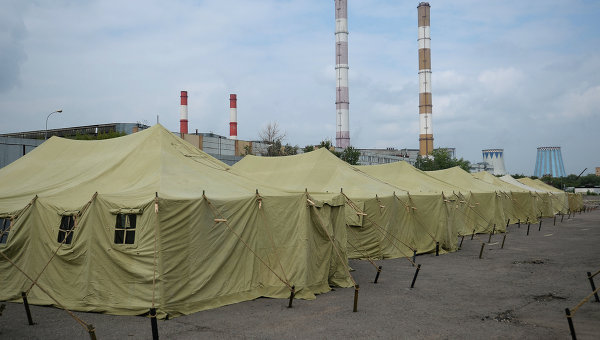MOSCOW, August 7 (RIA Novosti) – A Russian human rights group called on local officials Wednesday to launch a probe into a camp set up by the Moscow authorities for foreigners awaiting deportation that it claims is “unlawful.”
Police officials said that as of Wednesday morning up to 586 people, mostly Vietnamese nationals, were living in tents set up about a week ago in eastern Moscow, following a series of police raids targeting illegal immigrants.
Human rights campaigners from the Grazhdanstvoye Sodeistviye (Civil Assistance) NGO, who have repeatedly visited the camp, voiced concerns over conditions there and what it claimed were a series of violations of its inmates’ rights.
“We’ve written two petitions, one of them to the Investigative Committee, in which we requested it to open a criminal case. And the second one to the prosecutors,” Grazhdanstvoye Sodeistviye head Svetlana Gannushkina told reporters on Wednesday, adding the two petitions would be sent later in the day.
Gannushkina claimed there is no law allowing state officials to keep the detained migrants at the camp. “What has been done is a crime,” she said.
Under Russian law, detained foreigners are supposed to be kept at special centers for non-citizens. But the Moscow authorities ran out of space for such detainees last week after police rounded up hundreds of people in a series of round-ups focusing on outdoor markets.
The Golyanovo camp inmates holds citizens of Azerbaijan, Egypt, Kyrgyzstan, Morocco, Uzbekistan and Syria, the NGO said.
Gannushkina said the Syrians held in the camp face deportation to their war-torn homeland, where they most likely “face death.” She said that one of them has a valid visa for Russia, but, nevertheless, has been fined and was due to be deported. He came to Russia to visit his Russian uncle and find a way to move his Russian wife and four children from the Syrian city of Aleppo, where they are said to be staying now, she said.
Another detainee is an Afghan resident seeking refugee status in Russia, according to the NGO. He told the organization that he had to flee his homeland because of a death threat due to a vendetta.
“The camp is chaos,” Alexander Kulikovsky, a member of the Interior Ministry’s supervisory public council told reporters at a conference Wednesday, adding it still had no hot water and personal hygiene facilities. He said he visited the camp on Tuesday afternoon.
Kulikovsky echoed Gannushkina’s claims that the camp was illegal. He said many of the inmates did not even have time to collect their personal effects and documents when they were detained by the police.
The NGO activists say most of the migrants in the camp cannot speak Russian and are unable to fully participate in court proceedings over their deportation.
“Yes, they have to be deported, but they should have decent conditions,” Kulikovsky said.
The camp inmates are among thousands of immigrants detained in police raids since last week, in the wake of an attack on a police officer who was seriously injured at a Moscow market when attacked by an angry mob as he was trying to arrest a rape suspect.
The issue of illegal immigration has become a focal point in the campaign for the Moscow mayoral election on September 8. The city authorities have justified the raids targeting immigrants as part of a wider effort to clamp down on crime in Moscow.
“It is really [in response to] a demand from citizens; most of whom consider immigration a major problem,” acting Moscow mayor and mayoral candidate Sergei Sobyanin told Russian media in an interview released Wednesday.
Sobyanin said that the attack on the policeman was "the last straw" that had triggered a tough response. He said if there were no immigrants in Moscow, including internal immigrants from Russia, it would be “the world’s safest city.”
In an interview published last month, Moscow’s top prosecutor Sergei Kudeneyev said migrants are responsible for over 20 percent of crimes, according to last year’s statistics. That was down from “from 16,000 in 2008 to a bit over 8,000 in 2012,” he added.



